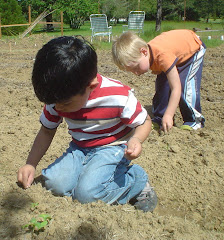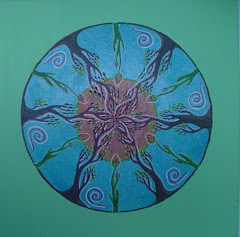 |
| Sunflowers stunted by herbicide contamination. |
Hi folks! It's been a long time since we posted
anything new. We've been feeling challenged by a number of things and
will write a more comprehensive post soon but wanted to get word out
about a situation we had with many of the 'starts' we planted from seed
this spring. Many of them were severely stunted or died from what
appears to be herbicide contamination in our potting soil (which we made
from combining last summer's compost and some composted horse manure).
We're posting this to our site in the hopes that people reading our
posts about the
deep mulch method
of gardening and folks using grass clippings, animal manures, or hay or
straw for mulch, or to build their compost piles will use discretion in
acquiring those materials.
Some herbicide chemicals can remain toxic for several years in plant materials and manure.
 |
| Herbicide-contaminated tomato plants |
We always knew that farming chemicals can have damaging and long-lasting
effects in the environment but didn't think
we would be effected as we
use no chemicals directly on our lawns or gardens.
It
is ironic that, after championing the use of "local", organic materials
to create garden fertility (instead of imported, concentrated
fertilizers that are often mined and produced unsustainably) that we
experienced such devastating results.
Of the hundreds of tomato and pepper seeds we started this year, not a single one was unaffected and all had to be thrown out!
If you are still using chemicals to fight weeds, we urge you to stop. Herbicide contamination is another reason to
only eat organic foods as they minimize the use of these chemicals in our environment.
Here are links to two excellent articles we found on the topic:
(LINK) - Gardener Alert! Beware of Herbicide- Contaminated Compost and Manure
(LINK) - Herbicide Carryover in Hay, Manure, Compost, and Grass Clippings
We encourage you to do research of your own and share your comments below if you have relevant experiences.
Here are the details of our situation:
Right
from the start, some of our seedlings did great but other varieties
would do fine until they began putting on their second set of leaves and
the leaves would begin curling in a distorted manner, never fully
unfurling so the plants couldn't photosynthesize (get energy from the
sun). We also noticed that some of the plants formed gold-colored
nodules right below the soil-level where the roots begin to branch and
on their root tips.
 |
| Onion starts did fine! |
Some of our seedlings
did fine:
- cabbages and kales
- cucumbers, squash and melons
- onions
- artichokes
But many of them did poorly or died altogether:
- tomatoes
- peppers
- peas, beans
- lettuce
- sunflowers, zinnias, marigolds
In
many cases we started seeds three, and four times. It took us
awhile to discover the likely source of our plant failures. For several
months we thought our plants were suffering because it was
so cool, wet and overcast; the Pacific NW - where we live, set records
both for rainfall, and consecutive days of cloud-cover this past winter
and spring. Plants sometimes develop a condition called
"damping off" - (LINK) where they rot at the soil-level.
 |
| Starting seedlings - before we knew our soil was contaminated. |
After
an on-line search, we found the articles listed above that outline the
symptoms we were experiencing and they attributed the problems to soil
contamination from
a class of
herbicides commonly used on golf-courses and other large public lawns,
and on fields that are destined to be planted in grass-seed, livestock
and horse-feed, and grain crops (such as wheat). These herbicides target broad-leaved weeds but do not kill grasses and grains. We haven't had our soil tested so we can't be
sure but we feel it
is likely that the wheat-straw we purchased to mulch our garden and
build up our compost-piles might have been tainted with one of the products listed in the article (
Clopyralid and
aminopyralid,
or something similar). It is also possible that one of the loads of
composted horse manure that was donated had not been composted long
enough and still contained herbicide residue.
 |
| OSU students sifting compost and manure to make potting soil. |
Compost Contamination: This is the first year in the
Sharing Gardens that we made our own potting soil. We've always
purchased it in the past. For many years Chris has had experience making his own potting mix (prior to the Sharing Gardens) and
always had good success with it. Last summer (2016) we made a
huge
amount of compost. It was made primarily from grass-clippings, wheat
straw and leaves. For the first time since starting the gardens, we
had enough excess compost after planting Fall crops, to save it for
making
potting soil.
Our recipe:
- 2-parts of our
compost
- 1-part of composted horse manure/sawdust and
- a small amount of
coffee grounds.
We don't know if the contamination came from manure
that wasn't composted long enough or the wheat-straw we used to build
our compost pilesl. We've checked
with all the people who have donated large quantities of grass-clippings
and none of them used any herbicides last year on their lawns so we feel confident that grass-clippings were not the source.
The
reason we think it was our potting soil that was contaminated is that
none of our seeds planted directly in the ground showed any of these
same signs of distress.
 |
| Compost bins(left) and grass-piles (center) for garden fertility. |
Note:
- Do not use contaminated compost or manures to make
"compost tea" if you are going to be pouring it on any of the families
of plants listed above. In addition, potatoes (in the same family of
plants as tomatoes, peppers, eggplant and tomatillos - solanacea should not be grown in contaminated soil or had tea applications. Lettuce may also be susceptible).
- Some chemicals can remain active in the soil. compost or manure for two years or more.
- They can harm vegetable and flower plants in concentrations as low as 3 parts-per-million!
- While it is unlikely that enough of these chemicals would be
present in lawn clippings from a residential source to contaminate your
compost or mulch-pile, there are several herbicides available from
garden-stores that do contain aminopyralid or clopyralid.
-- Here is a list of
herbicides and their active ingredients organized by trade names.
-- Here is an alphabetical list of
herbicidal active ingredients, with trade names following.
We encourage you to do research of your own and share your comments below if you have relevant experiences.
 |
| Carrots (front) and nasturtiums (back) are thriving this year! |
Once we discovered the source of our plants' distress, we bought some
regular potting mix and have successfully started lettuce and most of
our flowers. It's too late to start peppers and tomatoes. The only
pepper plants we have are ones we purchased at a nursery; unfortunately
we won't have many peppers to share this year.
 |
| Steve Rose, in a previous year, with tomato plants he donated to the Sharing Gardens and Monroe's Food Pantry. |
We're
grateful to our friend Steve Rose for dropping off dozens of tomato plants
he started from seed. If not for him and the tomatoes that
"volunteered" in our greenhouses from fruits that fell on the ground
last fall and sprouted this spring, we'd have no tomatoes. We've managed
to dig up and transplant almost eighty tomato seedlings and even have
had a few dozen to give away. Thank goodness for volunteers! (This is
another great reason for only growing heirloom/open-pollinated seeds: if
we had grown hybrid varieties of tomatoes, the "volunteers" could not
be counted on to "grow true".)
 |
| Thank goodness for kale! Delicious, nutritious and unaffected by herbicide contamination. |
On a happier note,
it's
now mid-June and we have most of the gardens planted. It's been a
challenging winter and spring but we're feeling optimistic for the
Summer and Fall to be able to fulfill our mission of providing bounteous
harvests of
vegetables to our local food charities.
LINK to Herbicide Contamination Update














































No comments:
Post a Comment